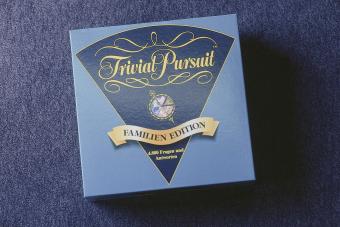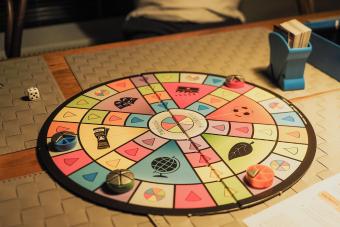
ullstein bild / Contributor / ullstein bild / Getty Editorial Use Getty Images License - Getty Editorial Use Trivial Pursuit Family Edition | Getty Editorial Use
On the nights when you can't make it to your weekly trivia event, you and your friends can always make do with a round of the famous trivia board game, Trivial Pursuit. As with a lot of board games and unlike many modern products, the inventors of Trivial Pursuit aren't immediately recognizable. Yet, their quickly conceived game that became a worldwide phenomenon is still played in homes today. Take a look at Trivial Pursuit's humble origin story and see how the titan of the trivia world got its start.
Two Journalists Have an Idea
In December 1979, two Canadian journalists, Chris Haney and Scott Abbott, were struck with the idea to create their own board game while playing a round of Scrabble one evening. Quickly, they devised a new game focused on players proving their knowledge on a variety of different subjects by answering trivia questions. Soon thereafter, they had a prototype, and after positive reviews from their close friends and family, the two embarked on an official enterprise together.
Joining forces with one family member and a friend, the four company owners spent two years finalizing the design, game play, trivia questions, and procuring the financing for the entire operation. In order to accumulate the proposed $75,000 necessary to build the prototype, Abbott and Haney found a little over 30 people to invest, and by the end of 1981, Trivial Pursuit was officially completed and registered, and domestic production began. The game that featured 6,000 trivia questions was an immediate success as over 100.000 copies of the game had been sold by 1982.
Trivial Pursuit Goes Stateside
Haney and Abbott brought their Canadian board game to the United States in 1983, and it was an overnight success, striking just the right nerve amongst competitive, know-it-all Americans. The game originally cost about $70 to make and sold for a fraction of the price, though by the time it reached the American market, it was selling for around $35. Its massive success cannot be overstated in terms of its reach and profitability; According to the Chicago Tribune, by 1987 Trivial Pursuit had sold copies to over 30 million Americans and grossed $750 million in sales, making it an undeniable titan of its industry.

JIP, CC BY-SA 4.0
Trivial Pursuit Brings More to the Table
One of the genius design features of the Trivial Pursuit board game was the fact that the regular 'Genus' edition's masterboard allowed the game developers to add supplementary packs of unique trivia cards for avid trivia fans to buy. Not only did this add to the game's longevity, but it also increased its profits substantially. Now, while you could purchase entire boards customized to these subsidiary card packs, you could also just purchase the question cards themselves to play along with your masterboard. Here are just some of the subsidiary packs you could purchase during the height of the Trivial Pursuit craze:
- All-Star Sports Edition (1983)
- Baby Boomer Edition (1983)
- Silver Screen Edition (1983)
- Genus II Edition (1984)
- Young Players Edition (1984)
- RPM Edition (1985)
- Welcome to America Edition (1985)
- Walt Disney Family Edition (1985)
- The 1960s Edition (1986)
- The 1980s Edition (1989)
- TV Edition (1991)
The Game's Success Bred a Lawsuit
Given the massive success of Trivial Pursuit, it's unsurprising that the creators would have stirred up some animosity among the trivia world and encouraged a few lawsuits surrounding its creation. One such $300 million lawsuit was instigated by Fred L. Worth, who was an encyclopedist who claimed that the creators infringed on the copyright of two of his trivia encyclopedias. He built his case on the defense that the Trivial Pursuit creators had stolen content from his work The Complete Unabridged Super Trivia Encyclopedia (1977). Despite corresponding evidence of the same typos and misspellings in Trivial Pursuit question cards that appear in "Super Trivia," the most damning evidence was Worth's own purposefully planted false fact also appeared one of the original game's question cards.
According to both "Super Trivia" and Trivial Pursuit, the famous television detective Columbo's first name was Philip, though this was an incorrect fact. Upon finding this error, Worth submitted a lawsuit on October 23, 1984. However, the case wasn't seriously pursued in court after the Trivial Pursuit creators admitted to copying both "Super Trivia" and other similar trivia sources. Gathering information from a variety of locations meant that their 'copying' wasn't viewed as plagiarism, and thus not worthy of a lawsuit. An appeals court in 1987 even found the creator's not-guilty of infringement, and so Trivial Pursuit lives on.
Take on Trivial Pursuit in the 21st Century
Trivial Pursuit continues to be a popular board game even 40 years after its conception. Adapted for modern audiences with specialty pop culture boards and digital editions, you can find a Trivial Pursuit perfect for you and your family to go to war over. Most encouragingly is the fact that the board game that became a late-20th century obsession began in the minds of two normal individuals and not from the hive mind of a substantial board game corporation. In the same way that Haney and Abbott took their small-time dream to the big leagues, so too can you.







